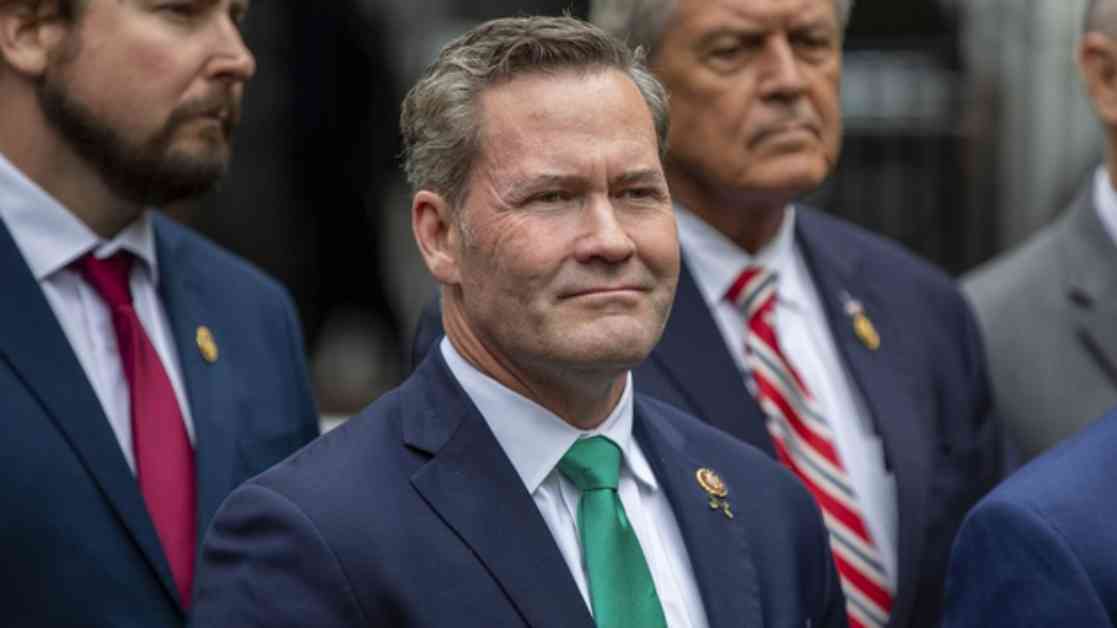Europe Must Take Responsibility for Security Challenges, Urges Adviser
As President Donald Trump enjoyed the spectacle of the biggest football game in New Orleans, his national security adviser, Mike Waltz, took to the airwaves to elaborate on a crucial interview given to the New York Post. The conversation revolved around a groundbreaking proposal that could potentially alter the geopolitical landscape. The idea in question? Trading security guarantees for Ukraine’s valuable rare metals.
During a flight on Air Force One, Trump mentioned a proposed $500 million agreement with Ukrainian President Volodymyr Zelensky. This agreement would grant the US access to rare earth minerals and gas in Ukraine in exchange for security guarantees as part of a potential peace settlement. The urgency of the situation was palpable as Trump implored Waltz to initiate crucial meetings to bring an end to the ongoing conflict. The president’s emotions were laid bare as he expressed, “Every day people are dying. Young, handsome soldiers are being killed. Young men, like my sons. On both sides. All over the battlefield.”
However, as Waltz conveyed a slightly different perspective to NBC News, the focus shifted towards Europe taking ownership of security matters post-conflict. Emphasizing the need for European nations to step up and manage the aftermath of the war, Waltz stated, “I think an underlying principle here is that the Europeans have to own this conflict going forward. President Trump is going to end it, and then, in terms of security guarantees, that is squarely going to be with the Europeans.” This shift underscores the evolving dynamics of global security challenges and the shared responsibility among nations to navigate these complex issues collaboratively.
Trump’s Strategic Diplomacy
In a strategic move that captured global attention, Trump revealed that he had recently engaged in discussions with Russian leader Vladimir Putin. The Kremlin’s response, shrouded in ambiguity, neither confirmed nor denied the existence of this exchange. The delicate dance of diplomatic negotiations was further highlighted as Waltz refrained from directly addressing queries about the alleged phone call. Instead, he focused on the collective strength of the US, Ukraine, and its allies when they convene for negotiations.
Waltz underscored the economic vulnerabilities of Russia and Trump’s readiness to employ various economic tools to influence the resolution of the conflict. The adviser’s insights shed light on the multifaceted approach being considered to bring all parties to the negotiation table. Echoing sentiments shared in conversations with global leaders, including President Xi and Prime Minister Modi, Waltz stressed the importance of a unified effort to end the war. This collaborative spirit underscores the interconnectedness of nations in addressing pressing security challenges.
The Path Forward: Leveraging Economic Partnerships
As discussions unfolded, it became apparent that future aid to Ukraine would be intrinsically linked to the proposed “rare earths” deal that Trump had alluded to earlier. Waltz articulated a strategic partnership that would intertwine economic interests with security commitments. He highlighted the potential for leveraging Ukraine’s natural resources, such as rare earths, oil, and gas, in a mutually beneficial arrangement. This innovative approach underscores the evolving landscape of geopolitics, where economic incentives play a pivotal role in shaping security alliances.
Amidst these critical deliberations, Trump’s schedule reflected a blend of strategic decision-making and personal pursuits. From a leisurely golf outing with Tiger Woods to boarding Air Force One for an unprecedented Super Bowl attendance, the president’s actions underscored the multidimensional nature of leadership in a complex geopolitical environment. The juxtaposition of high-stakes negotiations and recreational activities showcased the dynamic interplay between diplomacy and personal engagement.
As the world watches with bated breath, the unfolding saga of security challenges in Eastern Europe underscores the imperative for collective action and strategic foresight. The intersection of economic interests, security guarantees, and diplomatic overtures heralds a new chapter in global affairs. The road ahead may be fraught with uncertainties, but the shared commitment to peace and stability serves as a beacon of hope in tumultuous times.

















